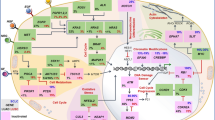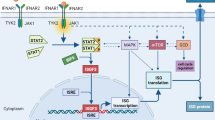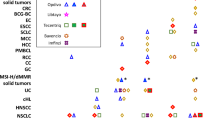Abstract
Incidences of endometrial adenocarcinoma are increasing in the USA with poor prognosis for patients with advanced disease. The current treatment standard is surgery including total hysterectomy and bilateral oophorectomy with surgical staging and adjunct treatment, such as chemotherapy or radiation. However, these methods do not present as an effective treatment option for poorly differentiated advanced cancers. Advancements in immunotherapy now offer a new approach for various types of cancer and specifically show promise in the treatment of endometrial adenocarcinoma. This review summarizes immunotherapeutic treatment options relevant to endometrial adenocarcinoma, such as immune checkpoint blockades, bispecific T-cell engager antibodies, vaccinations, and adoptive cell transfer. This study could be helpful for clinicians to identify treatment options more suitable for women with late-stage endometrial adenocarcinoma.
Similar content being viewed by others
References
Crosbie EJ, Kitson SJ, McAlpine JN, Mukhopadhyay A, Powell ME, Singh N. Endometrial cancer. Lancet. 2022;399(10333):1412–28. https://doi.org/10.1016/S0140-6736(22)00323-3. (PMID: 35397864).
Siegel RL, Miller KD, Wagle NS, Jemal A. Cancer statistics. CA Cancer J Clin. 2023;73(1):17–48. https://doi.org/10.3322/caac.21763. (PMID: 36633525).
Bokhman JV. Two pathogenetic types of endometrial carcinoma. Gynecol Oncol. 1983;15(1):10–7. https://doi.org/10.1016/0090-8258(83)90111-7. (PMID: 6822361).
Feinberg J, Albright B, Black J, Lu L, Passarelli R, Gysler S, Whicker M, Altwerger G, Menderes G, Hui P, Santin AD, Azodi M, Silasi DA, Ratner ES, Litkouhi B, Schwartz PE. Ten-year comparison study of type 1 and 2 endometrial cancers: risk factors and outcomes. Gynecol Obstet Invest. 2019;84(3):290–7. https://doi.org/10.1159/000493132. (PMID: 30602164).
Cancer Genome Atlas Research Network, Kandoth C, Schultz N, Cherniack AD, Akbani R, Liu Y, Shen H, Robertson AG, Pashtan I, Shen R, Benz CC, Yau C, Laird PW, Ding L, Zhang W, Mills GB, Kucherlapati R, Mardis ER, Levine DA. Integrated genomic characterization of endometrial carcinoma. Nature. 2013;497(7447):67–73. https://doi.org/10.1038/nature12113.
Wang X-Y, Fisher PB, editors. Immunotherapy of cancer. 1st ed. Amsterdam: Elsevier Academic Press; 2019. Accessed from: https://www.elsevier.com/books/immunotherapy-of-cancer/wang/978-0-12-817022-9
Demaria O, Cornen S, Daëron M, Morel Y, Medzhitov R, Vivier E. Harnessing innate immunity in cancer therapy. Nature. 2019;574(7776):45–56. https://doi.org/10.1038/s41586-019-1593-5.
Zhang Y, Zhang Z. The history and advances in cancer immunotherapy: understanding the characteristics of tumor-infiltrating immune cells and their therapeutic implications. Cell Mol Immunol. 2020;17(8):807–21. https://doi.org/10.1038/s41423-020-0488-6.
Thomas D, Bello DM. Adjuvant immunotherapy for melanoma. J Surg Oncol. 2021;123(3):789–97. https://doi.org/10.1002/jso.26329. (PMID: 33595889).
Reck M, Remon J, Hellmann MD. First-line immunotherapy for non-small-cell lung cancer. J Clin Oncol. 2022;40(6):586–97. https://doi.org/10.1200/JCO.21.01497.
Baxter D. Active and passive immunization for cancer. Hum Vaccin Immunother. 2014;10(7):2123–9. https://doi.org/10.4161/hv.29604.
Di Tucci C, Capone C, Galati G, Iacobelli V, Schiavi MC, Di Donato V, Muzii L, Panici PB. Immunotherapy in endometrial cancer: new scenarios on the horizon. J Gynecol Oncol. 2019;3:e46. https://doi.org/10.3802/jgo.2019.30.e46.
National Cancer Institute: Immune Checkpoint Inhibitors. Accessed from: https://www.cancer.gov/about-cancer/treatment/types/immunotherapy/checkpoint-inhibitors.
Pardoll DM. The blockade of immune checkpoints in cancer immunotherapy. Nat Rev Cancer. 2012;12(4):252–64. https://doi.org/10.1038/nrc3239.
Petitprez F, Meylan M, de Reyniès A, Sautès-Fridman C, Fridman WH. The tumor microenvironment in the response to immune checkpoint blockade therapies. Front Immunol. 2020;7(11):784. https://doi.org/10.3389/fimmu.2020.00784.
Sadreddini S, Baradaran B, Aghebati-Maleki A, Sadreddini S, Shanehbandi D, Fotouhi A, Aghebati-Maleki L. Immune checkpoint blockade opens a new way to cancer immunotherapy. J Cell Physiol. 2019;234(6):8541–9. https://doi.org/10.1002/jcp.27816.
Son J, George GC, Nardo M, Krause KJ, Jazaeri AA, Biter AB, Hong DS. Adoptive cell therapy in gynecologic cancers: a systematic review and meta-analysis. Gynecol Oncol. 2022;165(3):664–70. https://doi.org/10.1016/j.ygyno.2022.03.013.
Le DT, Uram JN, Wang H, Bartlett BR, Kemberling H, Eyring AD, Skora AD, Luber BS, Azad NS, Laheru D, Biedrzycki B, Donehower RC, Zaheer A, Fisher GA, Crocenzi TS, Lee JJ, Duffy SM, Goldberg RM, de la Chapelle A, Koshiji M, Bhaijee F, Huebner T, Hruban RH, Wood LD, Cuka N, Pardoll DM, Papadopoulos N, Kinzler KW, Zhou S, Cornish TC, Taube JM, Anders RA, Eshleman JR, Vogelstein B, Diaz LA Jr. PD-1 blockade in tumors with mismatch-repair deficiency. N Engl J Med. 2015;372(26):2509–20. https://doi.org/10.1056/NEJMoa1500596.
Ryan NAJ, Glaire MA, Blake D, Cabrera-Dandy M, Evans DG, Crosbie EJ. The proportion of endometrial cancers associated with Lynch syndrome: a systematic review of the literature and meta-analysis. Genet Med. 2019;21(10):2167–80. https://doi.org/10.1038/s41436-019-0536-8.
Zhao S, Chen L, Zang Y, Liu W, Liu S, Teng F, Xue F, Wang Y. Endometrial cancer in Lynch syndrome. Int J Cancer. 2022;150(1):7–17. https://doi.org/10.1002/ijc.33763.
O’Malley DM, Bariani GM, Cassier PA, Marabelle A, Hansen AR, De Jesus AA, Miller WH Jr, Safra T, Italiano A, Mileshkin L, Xu L, Jin F, Norwood K, Maio M. Pembrolizumab in patients with microsatellite instability-high advanced endometrial cancer: results from the KEYNOTE-158 study. J Clin Oncol. 2022;40(7):752–61. https://doi.org/10.1200/JCO.21.01874.
Marcus L, Lemery SJ, Keegan P, Pazdur R. FDA approval summary: pembrolizumab for the treatment of microsatellite instability-high solid tumors. Clin Cancer Res. 2019;25(13):3753–8. https://doi.org/10.1158/1078-0432.CCR-18-4070.
Oaknin A, Gilbert L, Tinker AV, Brown J, Mathews C, Press J, Sabatier R, O’Malley DM, Samouelian V, Boni V, Duska L, Ghamande S, Ghatage P, Kristeleit R, Leath C III, Guo W, Im E, Zildjian S, Han X, Duan T, Veneris J, Pothuri B. J Immunother Cancer. 2022;10(1):e003777. https://doi.org/10.1136/jitc-2021-003777.
Motzer RJ, Taylor MH, Evans TRJ, Okusaka T, Glen H, Lubiniecki GM, Dutcus C, Smith AD, Okpara CE, Hussein Z, Hayato S, Tamai T, Makker V. Lenvatinib dose, efficacy, and safety in the treatment of multiple malignancies. Expert Rev Anticancer Ther. 2022;22(4):383–400. https://doi.org/10.1080/14737140.2022.2039123.
Singh V, Sheikh A, Abourehab MAS, Kesharwani P. Dostarlimab as a miracle drug: rising hope against cancer treatment. Biosensors (Basel). 2022;12(8):617. https://doi.org/10.3390/bios12080617.
Makker V, Taylor MH, Aghajanian C, Oaknin A, Mier J, Cohn AL, Romeo M, Bratos R, Brose MS, DiSimone C, Messing M, Stepan DE, Dutcus CE, Wu J, Schmidt EV, Orlowski R, Sachdev P, Shumaker R, Casado HA. Lenvatinib plus pembrolizumab in patients with advanced endometrial cancer. J Clin Oncol. 2020;38(26):2981–92. https://doi.org/10.1200/JCO.19.02627.
Marth C, Tarnawski R, Tyulyandina A, Pignata S, Gilbert L, Kaen D, Rubio MJ, Frentzas S, Beiner M, Magallanes-Maciel M, Farrelly L, Choi CH, Berger R, Lee C, Vulsteke C, Hasegawa K, Braicu EI, Wu X, McKenzie J, Lee JJ, Makker V. Phase 3, randomized, open-label study of pembrolizumab plus lenvatinib versus chemotherapy for first-line treatment of advanced or recurrent endometrial cancer: ENGOT-en9/LEAP-001. Int J Gynecol Cancer. 2022;32(1):93–100. https://doi.org/10.1136/ijgc-2021-003017.
Wang Z, Cao YJ. Adoptive cell therapy targeting neoantigens: a frontier for cancer research. Front Immunol. 2020;5(11):176. https://doi.org/10.3389/fimmu.2020.00176.
Ralli M, Botticelli A, Visconti IC, Angeletti D, Fiore M, Marchetti P, Lambiase A, de Vincentiis M, Greco A. Immunotherapy in the treatment of metastatic melanoma: current knowledge and future directions. J Immunol Res. 2020. https://doi.org/10.1155/2020/9235638.
Cao W, Ma X, Fischer JV, Sun C, Kong B, Zhang Q. Immunotherapy in endometrial cancer: rationale, practice, and perspectives. Biomark Res. 2021;9(1):49. https://doi.org/10.1186/s40364-021-00301-z.
Santin AD, Hermonat PL, Ravaggi A, Bellone S, Cowan C, Coke C, Pecorelli S, Cannon MJ, Parham GP. Development and therapeutic effect of adoptively transferred T cells primed by tumor lysate-pulsed autologous dendritic cells in a patient with metastatic endometrial cancer. Gynecol Obstet Invest. 2000;49(3):194–203. https://doi.org/10.1159/000010246. (PMID: 10729762).
Bellone S, Black J, English DP, Schwab CL, Lopez S, Cocco E, Bonazzoli E, Predolini F, Ferrari F, Ratner E, Silasi DA, Azodi M, Schwartz PE, Santin AD. Solitomab, an EpCAM/CD3 bispecific antibody construct (BiTE), is highly active against primary uterine serous papillary carcinoma cell lines in vitro. Am J Obstet Gynecol. 2016;214(1):99.e1-8. https://doi.org/10.1016/j.ajog.2015.08.011.
Yang A, Jeang J, Cheng K, Cheng T, Yang B, Wu TC, Hung CF. Current state in the development of candidate therapeutic HPV vaccines. Expert Rev Vaccines. 2016;15(8):989–1007. https://doi.org/10.1586/14760584.2016.1157477.
Liu W, Tang H, Li L, Wang X, Yu Z, Li J. Peptide-based therapeutic cancer vaccine: current trends in clinical application. Cell Prolif. 2021;54(5):e13025. https://doi.org/10.1111/cpr.13025.
Gabrilovich DI, Nagaraj S. Myeloid-derived suppressor cells as regulators of the immune system. Nat Rev Immunol. 2009;9(3):162–74. https://doi.org/10.1038/nri2506.
Angelico G, Santoro A, Straccia P, Inzani F, Cianfrini F, Spadola S, Arciuolo D, Valente M, D’Alessandris N, Mulè A, Zannoni GF. Diagnostic and prognostic role of WT1 immunohistochemical expression in uterine carcinoma: a systematic review and meta-analysis across all endometrial carcinoma histotypes. Diagnostics (Basel). 2020;10(9):637. https://doi.org/10.3390/diagnostics10090637.
Ohno S, Kyo S, Myojo S, Dohi S, Ishizaki J, Miyamoto K, Morita S, Sakamoto J, Enomoto T, Kimura T, Oka Y, Tsuboi A, Sugiyama H, Inoue M. Wilms’ tumor 1 (WT1) peptide immunotherapy for gynecological malignancy. Anticancer Res. 2009;29(11):4779–84 (PMID: 20032435).
Coosemans A, Vanderstraeten A, Tuyaerts S, Verschuere T, Moerman P, Berneman ZN, Vergote I, Amant F, Van Gool SW. Wilms’ tumor gene 1 (WT1)–loaded dendritic cell immunotherapy in patients with uterine tumors: a phase I/II clinical trial. Anticancer Res. 2013;33(12):5495–500.
de Moura IA, Silva AJD, de Macêdo LS, Invenção MDCV, de Sousa MMG, de Freitas AC. Enhancing the effect of nucleic acid vaccines in the treatment of HPV-related cancers: an overview of delivery systems. Pathogens. 2022;11(12):1444. https://doi.org/10.3390/pathogens11121444.
Jäger E, Karbach J, Gnjatic S, Neumann A, Bender A, Valmori D, Ayyoub M, Ritter E, Ritter G, Jäger D, Panicali D, Hoffman E, Pan L, Oettgen H, Old LJ, Knuth A. Recombinant vaccinia/fowlpox NY-ESO-1 vaccines induce both humoral and cellular NY-ESO-1-specific immune responses in cancer patients. Proc Natl Acad Sci USA. 2006;103(39):14453–8. https://doi.org/10.1073/pnas.0606512103.
Kaumaya PT, Foy KC, Garrett J, Rawale SV, Vicari D, Thurmond JM, Lamb T, Mani A, Kane Y, Balint CR, Chalupa D, Otterson GA, Shapiro CL, Fowler JM, Grever MR, Bekaii-Saab TS, Carson WE 3rd. Phase I active immunotherapy with combination of two chimeric, human epidermal growth factor receptor 2, B-cell epitopes fused to a promiscuous T-cell epitope in patients with metastatic and/or recurrent solid tumors. J Clin Oncol. 2009;27(31):5270–7. https://doi.org/10.1200/JCO.2009.22.3883.
National Cancer Institute: SEER Stat Fact Sheets: Endometrial Cancer. Available from: http://seer.cancer.gov/statfacts/html/corp.html
Flynn JP, Gerriets V. Pembrolizumab. [Updated 2022 Jun 27]. In: StatPearls [Internet]. Treasure Island (FL): StatPearls Publishing; 2022 Jan-. Available from: https://www.ncbi.nlm.nih.gov/books/NBK546616/
Chen S, Wu Z, Shi F, Mai Q, Wang L, Wang F, Zhuang W, Chen X, Chen H, Xu B, Lai J, Guo W. Lenvatinib plus TACE with or without pembrolizumab for the treatment of initially unresectable hepatocellular carcinoma harbouring PD-L1 expression: a retrospective study. J Cancer Res Clin Oncol. 2022;148(8):2115–25. https://doi.org/10.1007/s00432-021-03767-4.
Mittica G, Ghisoni E, Giannone G, Aglietta M, Genta S, Valabrega G. Checkpoint inhibitors in endometrial cancer: preclinical rationale and clinical activity. Oncotarget. 2017;8(52):90532–44. https://doi.org/10.18632/oncotarget.20042.
Gómez-Raposo C, Merino Salvador M, Aguayo Zamora C, García de Santiago B, Casado SE. Immune checkpoint inhibitors in endometrial cancer. Crit Rev Oncol Hematol. 2021;161:103306. https://doi.org/10.1016/j.critrevonc.2021.103306.
Redondo A, Gallego A, Mendiola M. Dostarlimab for the treatment of advanced endometrial cancer. Expert Rev Clin Pharmacol. 2022;15(1):1–9. https://doi.org/10.1080/17512433.2022.2044791.
Oaknin A, Tinker AV, Gilbert L, Samouëlian V, Mathews C, Brown J, Barretina-Ginesta MP, Moreno V, Gravina A, Abdeddaim C, Banerjee S, Guo W, Danaee H, Im E, Sabatier R. Clinical activity and safety of the anti-PD-1 monoclonal antibody dostarlimab for patients with recurrent or advanced dMMR endometrial cancer. Future Oncol. 2021;17(29):3781–5. https://doi.org/10.2217/fon-2021-0598.
Acknowledgements
This study was supported by a grant from Des Moines University for Dr. Yujiang Fang (IOER 112-3749).
Funding
The authors have not disclosed any funding.
Author information
Authors and Affiliations
Contributions
YF initiated the idea. ACJ, KHB, TG, LAS, CRF, EDF, QB, and HDL wrote the draft. YF, LD, and MRW made critical revision to the draft.
Corresponding authors
Ethics declarations
Conflict of interest
The authors report no conflict of interest.
Ethical approval
By creating a review paper, there is no novel research; only research collected from prior sources that have been approved through the peer review process.
Informed consent
Since this is a review paper, consent is not applicable. No data have been collected needing informed consent.
Additional information
Publisher's Note
Springer Nature remains neutral with regard to jurisdictional claims in published maps and institutional affiliations.
Rights and permissions
Springer Nature or its licensor (e.g. a society or other partner) holds exclusive rights to this article under a publishing agreement with the author(s) or other rightsholder(s); author self-archiving of the accepted manuscript version of this article is solely governed by the terms of such publishing agreement and applicable law.
About this article
Cite this article
Jones, A.C., Brown, K.H., Guan, T. et al. The past, present, and future of immunotherapy for endometrial adenocarcinoma. Med Oncol 40, 186 (2023). https://doi.org/10.1007/s12032-023-02040-7
Received:
Accepted:
Published:
DOI: https://doi.org/10.1007/s12032-023-02040-7




